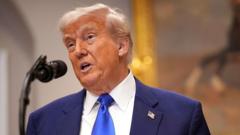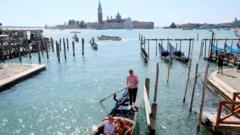European leaders express readiness to negotiate but brace for economic fallout from US tariffs, detailing specific national reactions and business impacts.
**Europe Prepares for Tariff Showdown as Trump’s Trade War Looms**

**Europe Prepares for Tariff Showdown as Trump’s Trade War Looms**
With a 20% tariff threat from the US, Europe is poised for negotiations while readying countermeasures.
As the news of a harsh 20% blanket tariff from the United States lands, European leaders are grappling with the potential fallout. "This is a disaster for the global economy," remarked French Prime Minister François Bayrou, echoing concerns from European Commission President Ursula von der Leyen, who warned about the dire implications for millions. The European Union, representing 27 member states, is set to respond thoughtfully, preparing countermeasures while remaining open to discussions with US officials.
EU Trade Commissioner Maros Sefcovic is scheduled to engage with American counterparts, advocating for a measured response. Despite the urgency to address fears within industries across Europe, nations are diverging in their approaches. Italian Prime Minister Giorgia Meloni swiftly convened an emergency summit to address the tariffs, a significant threat to Italy's wine and agrifood exports valued at €3.6 billion to the US. Concerns are high that US consumers may turn to cheaper alternatives, damaging authentic Italian sources.
Spain's Prime Minister Pedro Sánchez counters President Trump’s assertion of high tariffs, insisting the reality is far lower and calling the American approach an act of protectionism. Spain’s exports to the US could drop by 14%, leading Sánchez to unveil a €14.1 billion aid package aimed at diversifying markets. Economically vulnerable Slovakia, heavily reliant on industrial exports, anticipates a fall in economic output which raises alarms across the EU.
Simultaneously, the French wine and spirits sector faces daunting prospects, with warnings of a projected loss of €1 billion. Many producers, like Tuscany’s Marchesi Antinori, have already paused exports awaiting clarity on the trade situation and potential EU countermeasures. Investor sentiment across Europe has turned negative, particularly affecting companies like Adidas.
At the forefront of the EU's collective response is a dual-strategy approach, with plans to impose tariffs worth up to €26 billion on US goods. Further discussions are underway regarding an even larger set of retaliatory measures. While Germany decries this "unprecedented attack" on international trade, Chancellor Olaf Scholz emphasizes Europe’s sizable consumer market as a source of strength.
In a landscape fraught with uncertainty, some analysts like Peter Dige Thagesen highlight the potential cascading effect on small exporters, stressing the need for proportional responses while continuing dialogue to prevent further escalation. Although mostly unified in their condemnation of US tariffs, dissenting voices like Hungary's Foreign Minister Peter Szijjarto critique European leadership, blaming them for the crisis wrought by Trump's policies. Norway, a non-EU country, echoes similar concerns over economic impacts resonating through its export-driven economy.
As tensions rise, many analysts agree that this unfolding trade war holds broad implications for global trade dynamics, potentially affecting countless businesses and jobs across the continent.





















